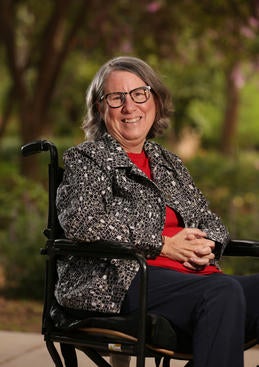The Geochemical Society has bestowed its highest honor on UCR’s Marilyn Fogel, distinguished professor emerita of geo-ecology.
For major achievements in geochemistry over the course of a career, the society annually gives its Victor M. Goldschmidt Award.
This year, Fogel won the award for her revolutionary use of stable isotopes — non-radioactive forms of atoms — in ecology, geochemistry and cosmochemistry.
She uses these isotopes to reveal information about biological and geological activity over time, including climate, migration and diet. Her work, which she describes in this Geochemical Perspectives paper, crosses the boundaries of academic disciplines as well as geographic borders.
Fogel’s fieldwork has taken her to the deserts of Australia, the Bermuda Triangle’s Sargasso Sea, and other desolate locations to help her answer questions about Earth’s past and its possible future. She collects fossils that offer clues into the way extinctions happened and how climate changes over time.
In addition to searching for clues to answer big questions about Earth’s history, Fogel also analyzes meteorites to answer questions about whether there is life elsewhere in the universe and how life might function on other planets.
"Consistently innovative, world-class studies across wide-ranging fields are a hallmark of her career, with a diversity of research questions that is unique among the leading biogeochemists and isotope ecologists in the world," said UCR Distinguished Professor of Biogeochemistry Timothy Lyons.
"I would be remiss, however, if I didn’t highlight her remarkable contributions as a mentor, particularly for women and early career scientists, and her leadership since arriving at UCR in efforts to address the numerous environmental and societal challenges of the Salton Sea," he said.
Currently, Fogel serves as chair of UCR's Salton Sea Task Force, established in 2019 to raise awareness of the environmental and health issues facing both the Salton Sea and the communities surrounding it.
Fogel has been a Fulbright Scholar and past president of the Biogeosciences section of the American Geophysical Union, and she served on the National Research Council’s Space Studies Board. She was the first woman ever to win the Alfred Treibs Medal in organic geochemistry for lifetime achievement in the field.
In 2019, she received the rare honor of election to the National Academy of Sciences. Nearly 200 living members of the academy have won Nobel Prizes.
The 71-year-old nonprofit Geochemical Society counts thousands of scientists from 74 countries as members. It was founded to encourage the application of chemistry to solving problems involving geology and cosmology.
The Goldschmidt award includes an engraved, gold-plated bronze medal, an honorarium of $1,500, a travel stipend and inclusion in the society as a Geochemistry Fellow.
